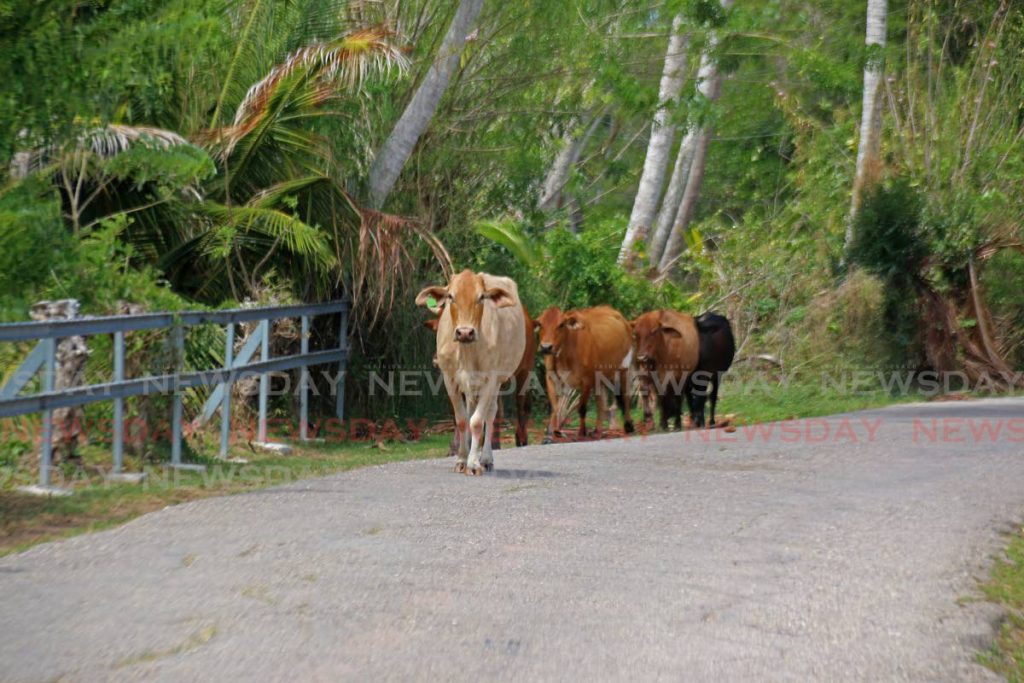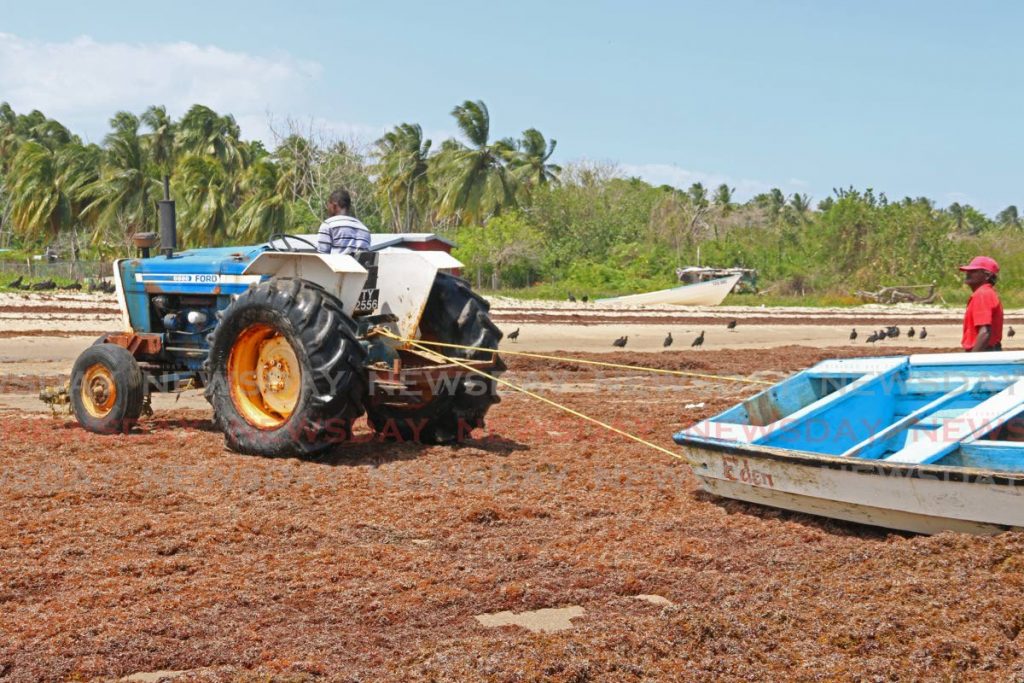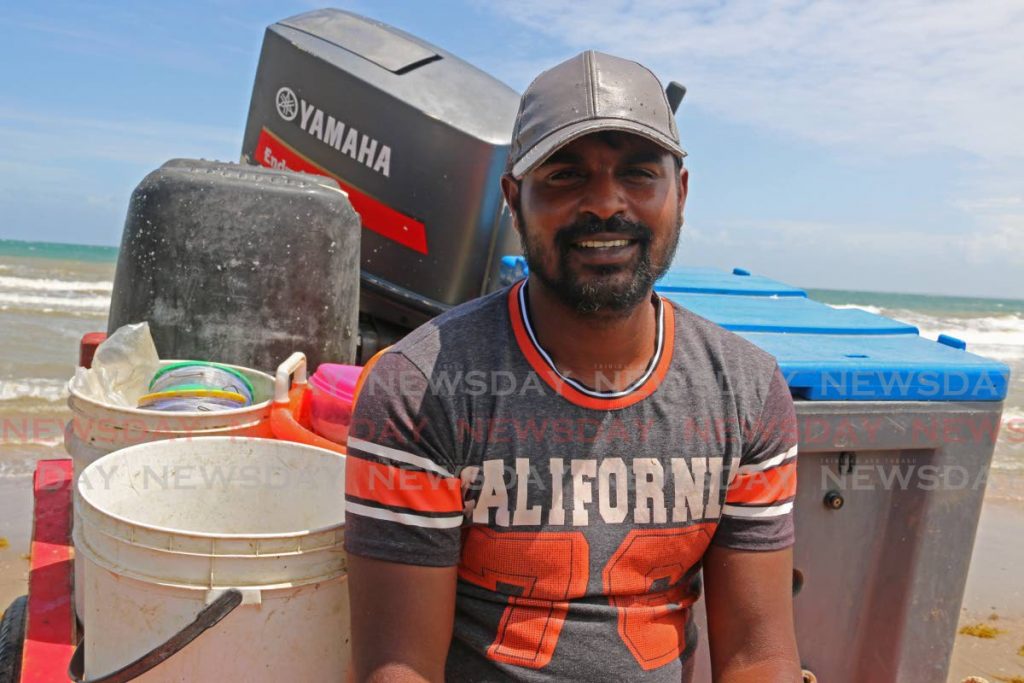Life in Icacos during the covid19 pandemic

TALL grass, a seemingly never-ending trail surrounded by coconut trees, wetlands, cows, fishermen and their boats, the salty scent of the sea. You are now in the southwestern village of Icacos. It’s a place many refer to as “the end of the country,” but to the villagers, it is simply home.
On an average day, the remote area is usually quiet. But amid the covid19 pandemic, it has almost become a ghost town. Newsday reporter Narissa Fraser and photographer Marvin Hamilton visited the village to observe how life has changed for residents owing to the covid19 pandemic.
The Icacos Health Centre only opens on Tuesdays for an integrated clinic and on Wednesdays for an ante-natal clinic. So, when Newsday ventured to the facility during its Thursday visit to chat with some frontline workers, the only person present was a security guard who indicated the days it opens.
But asked if he ever feels worried working at a health centre during a pandemic, he said, “Of course, every day. And my hours have changed as well.”
The next closest health facility is the Cedros Health Centre which is approximately a 30-minute drive away.
The security guard was not wearing a mask. In fact, no one Newsday met throughout the trip wore one.
The Coral Point beach typically has many visitors on an average day, according to villagers. Not just those wishing to take a dip into the water or build sandcastles on the shore, but also fishermen and vendors.
The shore was not only lined with anchored fishing boats but with foul-scented sargassum seaweed and corbeaux.

Newsday only saw two groups of fishermen - a father and son that had just returned with their daily catch a few minutes before noon, and another group on their way to get theirs.
Later on, one man was seen breaching the current restrictions as he took a chance and bathed in the water.
Ramcharitar Massey, 59, said he has been fishing all his life. He said business has slowed down since the pandemic reached TT.
“We never see anything like this before,” Massey said. “Things real slow cause not everybody coming down on this side to buy again.”
In January 2019, Icacos and Cedros fishermen told Newsday the freshwater fish market “declined drastically.”
But Massey said while he is certainly used to fluctuations in sales, this has been one of the worst he has ever experienced.
He said fishermen don’t make much money and that it is the vendors who buy from them to sell in the market who make the “real profit.” He said fishermen are not to be blamed for high prices as fish markets.
He said on an average day, at least 14-15 boats are usually out at sea with teams of fishermen. But that day, just two groups went out.
Asked if they have been receiving any assistance from the government or NGOs (non-governmental organisations) such as hampers, he said, “That is one thing we don’t get down here at all. We doh ever get dem thing here. Even before covid19, down in Icacos here? Never. That’s why so many people here say we have to depend on ourselves cause the government doh give we nothing.”
But he said he has been keeping up-to-date with all news and updates on the virus.
“I doh miss d news for nothing,” he said, adding that he believes the Prime Minister has handled the crisis well.
Apart from slow sales, his son Adrian Massey, 29, told Newsday his life has not been affected since he “doesn’t go anywhere anyway.” He said his life entails “home and going to the sea and back.”

In addition to fishing, over the years, Icacos has been known for having Venezuelan residents, often owing to illegal entry.
There was a small community on the shore of the Coral Point beach consisting of TT nationals and Venezuelans. The structures were built out of mostly wood and pieces of galvanize.
The Venezuelans barely knew any English, so Newsday chatted with them in their native tongue.
Elba Espinosa, 51, said she has been in TT for one year. She lives with her son Alvaro Perez and his wife Milina Gonzales.
She said the three of them are all registered.
While Icacos is a fairly remote area, Espinosa enjoys living there and has no plans to move. She said not having to pay rent is also a plus, and they don’t have to worry about crime in the area.
Asked if they ever venture to Point Fortin or San Fernando, Gonzales said, “Yeah, once in a while and for a short time.”
Perez said they have a lot of “fisherman friends” who they occasionally assist and vice-versa.
They all said they’re not particularly worried about the covid19 virus.
In addition to this community, there are also several stray dogs on the shore of the beach. During the interview, Perez had to chase a few away that kept coming by their house. Asked if he wanted a dog, he said no.
While there, a crew of coast guardsmen also visited the beachfront community. The first group of people they spoke to were the Venezuelans, and they also searched some parts of their home. They instructed Newsday not to take any photos of them, but said they simply “heard there was a Venezuelan community here and are just doing checks to make sure everything is okay.”
Asked if it was a problem for the Venezuelans to be living there, Newsday was told, “That’s not exactly our call.”
But this visit prompted one of the TT nationals to voice a few complaints to the reporter.
Emmanuel Clarke, 42, who fishes and picks coconuts told Newsday when people come to the area, they only help Venezuelans. His wife, Lalitha Tambie also agreed.
“It have rel poor people in Icacos,” Tambie said.
Clarke added, “No English-speaking people are getting help from the government in Icacos right now. They’re only paying attention to the Spanish right now. It seems as though you have to try to speak Spanish to get something.
“How could that happen? Could you explain that to me? Where in Venezuela can a TT national go and have more privilege than Venezuelans?”
The couple does not have access to electricity and when they attempted to make the necessary connections, TTEC police, they said, came and disconnected them. But the Venezuelans were “given a bligh.”
TALL grass, a seemingly never-ending trail surrounded by coconut trees, wetlands, cows, fishermen and their boats, the salty scent of the sea. You are now in the southwestern village of Icacos. pic.twitter.com/jCKu5KGVdX
— T&T Newsday (@Newsday_TT) May 25, 2020
nbsp;
They also commented on how much more quiet the community has been owing to covid19.
“Before this pandemic, the place (beach) would have been so busy,” Clarke said. “You would have been seeing at least three tractors on the beach right now pushing and pulling in boats, and vendors buying fish. You’re not even seeing that.”
Tambie said she mostly goes shopping in Cedros and couldn’t recall the last time she had ventured as far as Point Fortin. She said it is often difficult to get transport.
“If you ain’t get the bus at the particular hour…”
Clarke said he recently “got stranded” in Point Fortin. He arrived at 10.30pm and left at around 2am after his wife managed to hire a taxi for him.
“It was so bad that I had already made up my mind to sleep in Point under a table and wait for the 6am bus to go down.”
But the two said prior to covid19, they felt just as neglected by the government, adding that they only see its members during election season. Other villagers who chatted with Newsday expressed similar sentiments. None of them were able to recall the last time they had seen any government minister in person. They even said it’s not often they see members of the media either.
There were barely any vehicles on the road during Newsday’s visit. The condition of the roadways was not the best either as it was riddled with several potholes.
In October 2019, there was a mosquito invasion in Cedros and Icacos. Personnel from the Insect Vector Control Unit in Cedros had to be called in.
But although it is no longer as bad, the problem still exists. In addition to mosquitos, villagers say they often have to deal with sand flies and rain flies owing to living within close proximity to the beach.
Many said apart from fishing and farming, there aren’t many available jobs in the area.
Newsday reporter Narissa Fraser and photographer Marvin Hamilton visited the village to observe how life has changed for residents owing to the covid19 pandemic. pic.twitter.com/TCmiXt2YHG
— T&T Newsday (@Newsday_TT) May 25, 2020
But no one appeared to be fearful of the covid19 virus.
Newsday left at around 2pm and the village was just as empty and quiet as it was upon arrival. There were more cows on the road than vehicles.


Comments
"Life in Icacos during the covid19 pandemic"